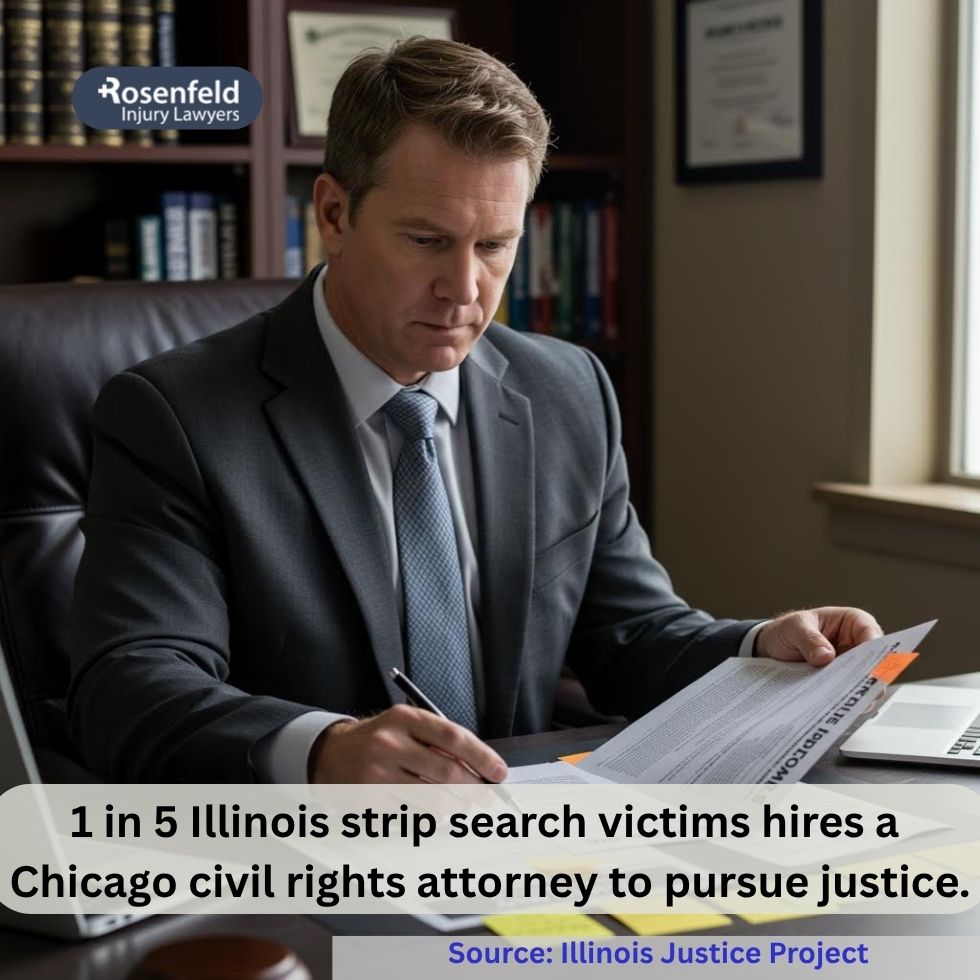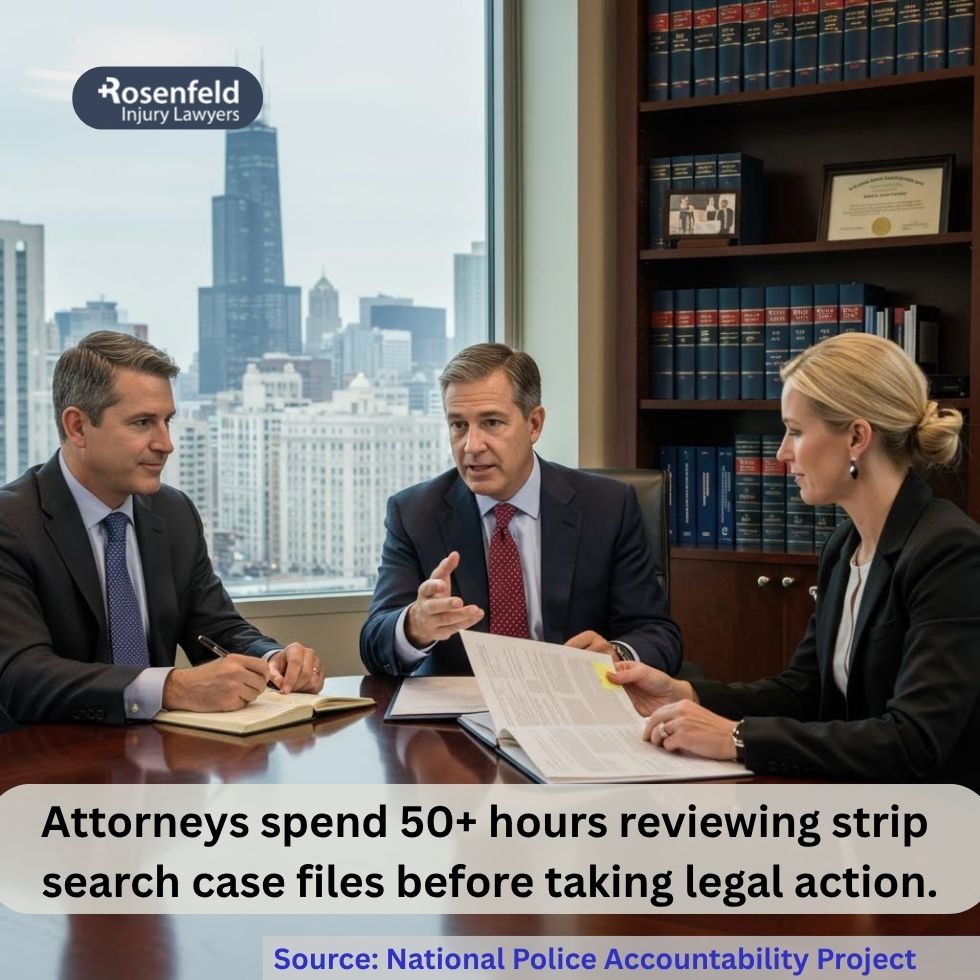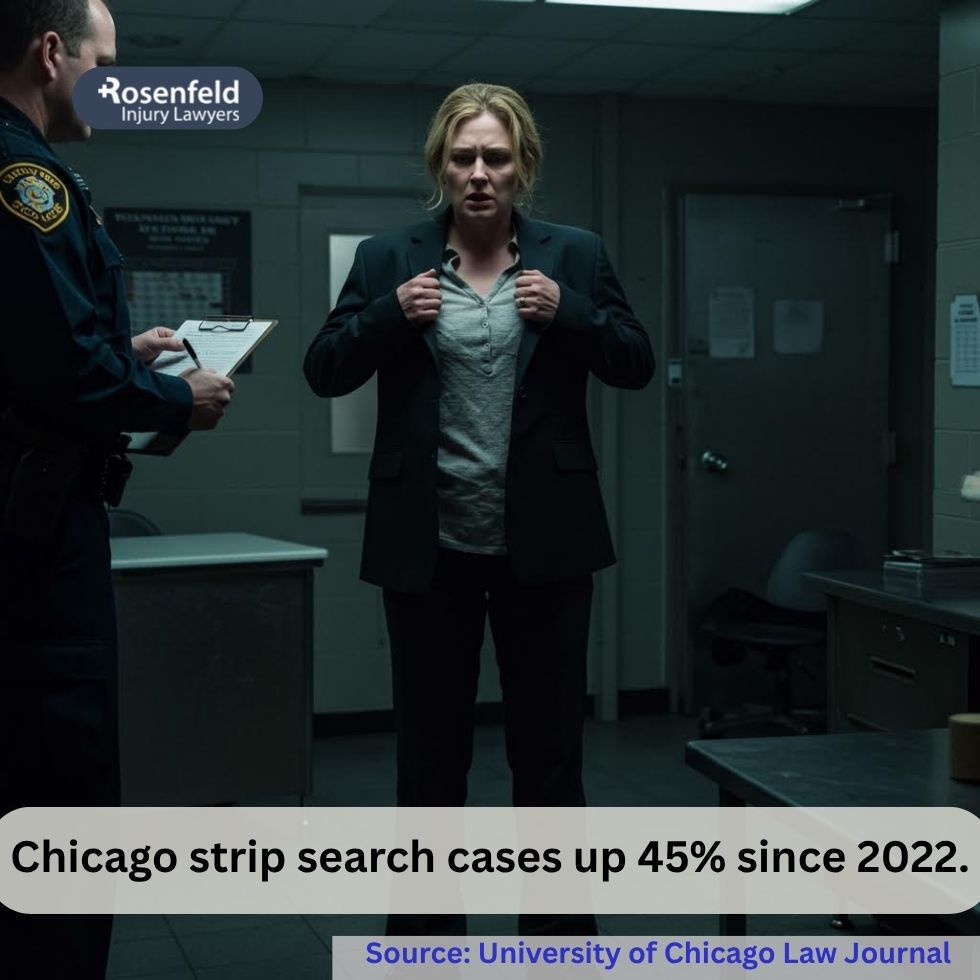- 24/7 Free Consultation: (888) 424-5757 Tap Here To Call Us
Illegal Strip Search Lawsuit

Rosenfeld Injury Lawyers is committed to holding jails, private security guards, and other entities accountable when someone is illegally strip-searched. We can help you file an illegal strip search lawsuit across Chicago and throughout Illinois, including those involving class action claims on behalf of prisoners or arrestees who were subjected to unlawful searches.
Being subjected to a strip search is one of the most invasive actions law enforcement officers or correctional facility staff can take. While certain searches may be allowed under specific legal conditions, an illegal strip search violates a person’s Fourth Amendment right to be free from unlawful searches.
We understand the lasting trauma that illegal strip searches can cause, especially when they occur without reasonable suspicion or are conducted on individuals held for minor offenses. If your rights were violated, our team is here to help you pursue justice and seek compensation.

Your Rights Against Illegal Strip Searches
Every person in the United States has a fundamental right to privacy and bodily integrity. These rights are protected by the Constitution and ensure that government officials—whether they are police officers, correctional officers, or private security guards acting under color of law—cannot conduct intrusive searches without strong legal justification.
Strip searches are among the most invasive forms of search and should never be taken lightly or used routinely, especially for people arrested for minor crimes like unpaid child support or traffic violations.
The law makes it clear: unreasonable strip searches violate a person’s dignity and can have lasting emotional consequences. You do not lose your right to be treated with respect simply because you are arrested or taken into custody. The need for a reasonable or legitimate expectation of safety or security must be weighed against your right to privacy. That balance is why courts closely examine whether a strip search is reasonable and lawful.
If you believe your rights were violated—if you were illegally strip-searched without proper cause—Rosenfeld Injury Lawyers can help. Our legal team is experienced in handling these sensitive claims, and we are prepared to stand up for your constitutional protections throughout Illinois.
The Fourth Amendment and Unreasonable Searches
The Fourth Amendment to the U.S. Constitution protects people from “unreasonable searches and seizures.” In simple terms, it prevents the government from invading your privacy without a solid legal reason. When it comes to strip searches, courts recognize them as highly invasive, so much so that they are subject to the highest level of scrutiny.
To be lawful, a strip search typically must be based on reasonable suspicion that the individual is hiding contraband, weapons, or other dangerous items. For nonviolent or minor offenses, the courts generally require a very specific and fact-based reason to justify such an invasive search. Blanket strip search policies applied to all arrestees, without consideration of the crime or risk involved, have been widely challenged as unconstitutional.
In jail or prison settings, the rules can differ. However, even in correctional facilities, unreasonable strip searches may violate constitutional rights if they are conducted without a valid reason, in an abusive manner, or in ways that unnecessarily expose people to humiliation, especially in front of other prisoners.
Understanding whether your search was “unreasonable” under the Fourth Amendment depends on the specific facts. At Rosenfeld Injury Lawyers, we help clients evaluate these circumstances and determine whether their rights were violated by law enforcement officers, TSA agents, or jail officials.
When Are Strip Searches Considered Illegal in Illinois?
In Illinois, as in the rest of the United States, strip searches are governed by the Fourth Amendment’s prohibition against illegal searches. Whether a search is deemed “unreasonable” depends heavily on the specific facts, the setting, and how the courts have interpreted constitutional standards, particularly the Seventh Circuit Court of Appeals and the U.S. Supreme Court.
A strip search may be considered illegal in Illinois under several common circumstances:
Lack of reasonable suspicion or probable cause: The government must have a valid reason to conduct a strip search. This means having specific, articulable facts suggesting that the person may be concealing contraband, weapons, or other dangerous items. If the search is based on routine procedure alone, without a case-specific reason, it may violate the Fourth Amendment.
Minor offenses with no safety concerns: Courts often find it unconstitutional to strip search individuals arrested for minor crimes, especially when there is no suspicion of hidden contraband. Automatically subjecting arrestees in these cases to invasive searches often fails constitutional scrutiny.
Public or humiliating searches: Even if a strip search is justified, it must be conducted in a private, respectful manner. Performing a search in front of other inmates, officers, or members of the opposite sex without a clear justification can render it unlawful.
Cross-gender strip searches: Illinois courts scrutinize cross-gender strip searches, particularly when there is no emergency. These are considered especially invasive and must meet a higher burden of justification.
Blanket search policies in jails or detention centers: Policies that subject all pre-trial detainees or arrestees to strip searches, regardless of the offense, are often challenged in class action lawsuits. Courts typically require individualized suspicion to justify such searches, especially when applied to nonviolent offenses.
If you were subjected to a strip search under any of these circumstances, you may have grounds for a lawsuit.

Common Locations
Illegal strip searches can occur in several different settings, though the legal standards vary depending on the context. One of the most litigated environments for unreasonable strip searches is jail intake, particularly at large detention centers like Cook County Jail, which has been the focus of numerous lawsuits and significant settlements tied to blanket strip search policies.
Police stops and street arrests are another scenario where unreasonable strip searches sometimes occur, though courts rarely permit such searches in these situations. Unless officers have clear probable cause to believe someone is hiding drugs, weapons, or other contraband under their clothing, forcibly conducting a strip search on the street or in a police station may violate the Fourth Amendment.
These cases often arise when individuals arrested for low-level or nonviolent offenses are subjected to unnecessary physical searches without any specific evidence suggesting a threat or concealed item.
Jail intake procedures have historically involved blanket policies subjecting all incoming detainees to strip searches, regardless of the offense. Courts have pushed back on these one-size-fits-all practices, especially when applied to people arrested for minor charges. Strip searches must be based on individualized suspicion, not simply the act of being detained.
Prison settings allow for broader authority to search inmates for safety reasons, but searches must still follow constitutional guidelines and avoid degrading or excessive conduct.
In some school environments, strip searches are judged by different standards, but courts have held that they’re only permissible under extreme and well-justified circumstances.
Private security guards, such as those in retail stores or private facilities, operate under different laws. Strip searches by private actors may lead to claims under state tort law, such as invasion of privacy or assault.

Filing Lawsuits for Illegal Strip Searches
Victims of illegal strip searches have the right to pursue legal action and seek compensation for the violation of their constitutional rights. The most common way to bring these claims is by filing a civil rights lawsuit under 42 U.S.C. § 1983. This federal statute allows individuals to sue government officials—including police officers, correctional staff, and jail administrators—when they engage in unlawful conduct while acting under the color of state law.
For a strip search to be considered unlawful, it typically must lack reasonable suspicion, be performed in an overly invasive or public manner, or be done as part of a blanket policy without individualized justification.
If successful, victims may recover monetary damages for emotional distress, humiliation, and other harm caused by the unconstitutional search. In some cases, punitive damages and attorneys’ fees may also be awarded.
In situations where many people have been subjected to similar unlawful strip search practices, a class action lawsuit may be appropriate. Class actions are often used when systemic policies affect a large group of people. One well-known example is the Los Angeles County strip search class action, which resulted in a substantial settlement for thousands of detainees who were improperly searched.
Cook County has also faced lawsuits over routine, unjustified strip searches, particularly targeting individuals booked on minor crimes. These cases often expose illegal, one-size-fits-all search policies that violate constitutional protections.
Whether pursued individually or as part of a class, these lawsuits play a critical role in holding institutions accountable and preventing future abuse.
Compensation for Victims of Unlawful Searches
Victims of unlawful strip searches may be entitled to several forms of compensation through a civil rights lawsuit. The core of most claims is compensatory damages, which are intended to address the actual harm suffered by the person who was illegally searched. In these cases, the harm is often psychological and emotional, rather than physical.
Being subjected to a strip search without legal justification can cause significant emotional distress, including humiliation, embarrassment, anxiety, depression, and in some cases, post-traumatic stress disorder (PTSD). These effects can be long-lasting and disruptive, especially when the search was conducted in a degrading, public, or invasive manner.
Although physical injury is less common, it can occur, particularly if the search involved unnecessary force, rough handling, or unsafe conditions. In such instances, damages may also include compensation for medical bills or ongoing treatment.
In more serious cases, courts may also award punitive damages. These are not meant to compensate the victim but to punish the individual officer or official whose conduct was especially reckless, malicious, or egregious. Punitive damages are often sought when a strip search was clearly illegal and involved deliberate misconduct.
Victims may also be able to recover attorneys’ fees and legal costs, especially if the lawsuit is brought under § 1983 and results in a favorable judgment or settlement.

The Role of Supreme Court Decisions in Defining Search Standards
The United States Supreme Court plays a central role in defining what constitutes a “reasonable” search under the Fourth Amendment, including the legality of strip searches. Its rulings establish nationwide standards that lower courts, law enforcement agencies, and correctional facilities must follow.
One of the most influential cases involving strip searches is Florence v. Board of Chosen Freeholders (2012). In that decision, the Court ruled that jail officials could conduct visual body cavity searches on all individuals being processed into a general jail population, even for minor crimes, and without individualized suspicion.
The majority reasoned that security concerns in jails justify a broad authority to search incoming detainees. However, the Court also emphasized that searches must be reasonable in scope and manner, leaving room for future challenges based on how a search is carried out.
While Florence provided legal cover for some intake searches, it did not grant blanket immunity. The ruling does not excuse degrading or retaliatory strip searches, cross-gender searches done without need or policy, or those done without any connection to jail security. Courts continue to rely on this and other precedents to evaluate whether specific searches—especially outside the jail context—violate constitutional protections.
Why You Need an Experienced Civil Rights Attorney
Pursuing a lawsuit involves more than proving that the search felt wrong—it requires a deep understanding of constitutional law and civil rights litigation. Fourth Amendment claims can be difficult to prove without a lawyer who knows how courts interpret “unreasonable searches” and how to navigate the legal protections that often shield government entities and officers from liability, including qualified immunity.
An experienced civil rights attorney will know how to build a compelling case by gathering evidence, identifying policy violations, and working with expert witnesses to prove emotional and psychological harm. If your case involves multiple victims and a pattern of misconduct, such as a blanket jail intake policy, a skilled attorney can guide the process of filing or joining a class action lawsuit.
Whether you’re seeking individual justice or systemic change, having the right legal representation can make the difference between a dismissed claim and meaningful compensation.
Contact Our Firm for a Confidential Consultation

If you believe you were illegally strip-searched by law enforcement or correctional staff in Chicago, you don’t have to face it alone. Our firm is committed to holding government actors accountable for unreasonable strip searches and helping victims seek justice and compensation.
We offer free, confidential consultations to review your experience and explain your legal options. There are no upfront costs—we work on a contingency fee basis, meaning you pay nothing unless we recover compensation for you.
Call us at (888) 424–5757 or fill out our contact form to speak with a civil rights attorney who understands how to protect your rights.
All content undergoes thorough legal review by experienced attorneys, including Jonathan Rosenfeld. With 25 years of experience in personal injury law and over 100 years of combined legal expertise within our team, we ensure that every article is legally accurate, compliant, and reflects current legal standards.







